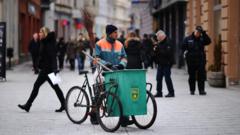In July 1995, more than 8,000 Bosnian men and boys were brutally killed by Bosnian Serb forces in Srebrenica, marking the most notorious war crime in Europe since World War Two. Decades later, the pain of that tragedy lingers heavily over the region, as exemplified by the world premiere of the play Flowers of Srebrenica at Sarajevo's War Theatre. In a haunting depiction, the audience witnessed characters digging through the earth for remnants of the past, as personal items like watches and shoes served as tangible memories of the lost.
While the mass murder took place under the purported protection of UN forces, Dutch soldiers stood by as Bosnian-Serb General Ratko Mladić facilitated the execution of thousands. In a deliberate attempt to erase the evidence of their heinous crime, the perpetrators scattered the remains across multiple graves, leaving families in perpetual mourning as many still search for their loved ones.
The ongoing chasm in Bosnia and Herzegovina’s society was palpable as applause erupted in Sarajevo, countered by a complete lack of acknowledgment in the majority-Serb Republika Srpska, where political leaders continue to dismiss the reality of genocide. Selma Alispahić, the lead actress, voiced her frustration, stating that the consistent denial of undeniably proven truths only serves those who benefited from the war.
The Dayton Peace Agreement, which brought an end to the conflict, unwittingly entrenched ethnic divisions, forming two entities based on nationality. Current leader Milorad Dodik has been leveraging this divide to reclaim political power, challenging both national institutions and international oversight. The push for a "reserve police force," echoing the militia of the past, has raised alarm among residents who fear a return to conflict.
With recent commemorative ceremonies in Sarajevo, thousands sought to pay respects to the victims of Srebrenica, but only minutes away in East Sarajevo, public mourning was conspicuously absent. Officials from Republika Srpska, including Saša Košarac, argue that remembrance perpetuates division, asserting that all sides were guilty of atrocities during the conflict.
Meanwhile, many dedicated souls, like Mirela Osmanović from the Srebrenica Memorial Centre, express growing anxiety about the resurgence of ethnic tensions. She and others born from trauma remain hopeful for solidarity yet worry that manipulative political strategies will further jeopardize their security and prospects for a peaceful future. As echoing memories of the 1990s resurface, both survivors and authorities continue to grapple with the haunting legacy of Srebrenica.
While the mass murder took place under the purported protection of UN forces, Dutch soldiers stood by as Bosnian-Serb General Ratko Mladić facilitated the execution of thousands. In a deliberate attempt to erase the evidence of their heinous crime, the perpetrators scattered the remains across multiple graves, leaving families in perpetual mourning as many still search for their loved ones.
The ongoing chasm in Bosnia and Herzegovina’s society was palpable as applause erupted in Sarajevo, countered by a complete lack of acknowledgment in the majority-Serb Republika Srpska, where political leaders continue to dismiss the reality of genocide. Selma Alispahić, the lead actress, voiced her frustration, stating that the consistent denial of undeniably proven truths only serves those who benefited from the war.
The Dayton Peace Agreement, which brought an end to the conflict, unwittingly entrenched ethnic divisions, forming two entities based on nationality. Current leader Milorad Dodik has been leveraging this divide to reclaim political power, challenging both national institutions and international oversight. The push for a "reserve police force," echoing the militia of the past, has raised alarm among residents who fear a return to conflict.
With recent commemorative ceremonies in Sarajevo, thousands sought to pay respects to the victims of Srebrenica, but only minutes away in East Sarajevo, public mourning was conspicuously absent. Officials from Republika Srpska, including Saša Košarac, argue that remembrance perpetuates division, asserting that all sides were guilty of atrocities during the conflict.
Meanwhile, many dedicated souls, like Mirela Osmanović from the Srebrenica Memorial Centre, express growing anxiety about the resurgence of ethnic tensions. She and others born from trauma remain hopeful for solidarity yet worry that manipulative political strategies will further jeopardize their security and prospects for a peaceful future. As echoing memories of the 1990s resurface, both survivors and authorities continue to grapple with the haunting legacy of Srebrenica.
















